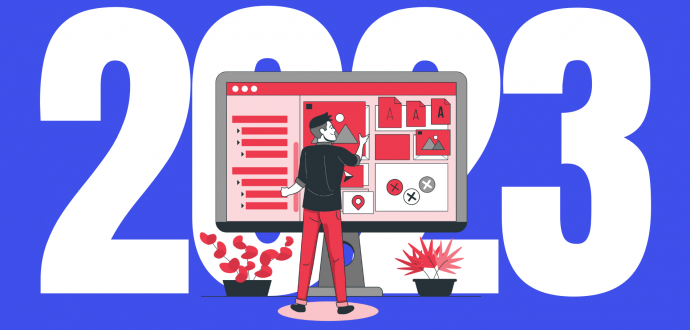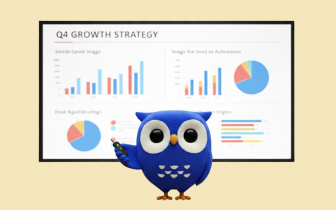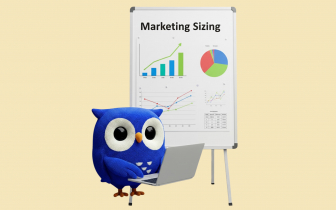5 Out-of-the-Box Content Marketing Predictions for 2023

You can’t put content marketing on hold. It is something that will always evolve and change under certain circumstances.
We all know that 2020 hardly influenced content marketing. Professionals' strategies and plans were to change and adapt to the new reality.
Content marketing had to know their customers in pre-pandemic times too. Yet, the post-pandemic world shows that marketing has to change to personalization v2.0. That said, now we need to segment audiences deeper, covering their needs country by country, state by state, and town by town.
It also became evident that you need to fight not exactly your competitors. Now past customer experiences influence your success. The point is to provide better experiences to the audience that becomes more demanding.
Relationships with customers become the core of the business. They were essential earlier. But the last few years showed that they could be your “rainy-day fund.” Even if there are dark times, loyal customers are those who will help your business to survive.
Content marketing stays among the powerful tools that enable effective communication between customers and brands. Thus, the content marketing revenue in 2022 reached approximately $66 million. Yet, professionals expect it to double by 2026.
Expected year-over-year change to content marketing budget worldwide in 2022
You can use various content marketing strategies to serve different goals, audiences, and generations. For example, according to Statista, blog articles were the most popular format in 2020, while video content was the most preferred in 2021. Most industry specialists that visual and video content will hold the garland of victory in 2022.
Yet, with 2023 at the door, you wonder how content marketing will change. And that’s the right thing to do!
Today we won’t talk about content marketing tactics that we all know. Moreover, we described the common content marketing approaches that will stay in 2023 in our previous articles. (You can check everything here, here, and here.)
In this article, we will talk about unexpected content marketing trends that can change the industry.
1. IoT (Internet of Things)
The Internet of Things refers not only to IT specialists. Actually, that’s something that surrounds us in the everyday life.
Think for yourself - we live in the world of smart technologies. Of course, this might bring lots of challenges. Yet, bright opportunities come along too.
The rising number of IoT devices means marketers have more data. So, its collection and analysis allow us to know our audience better. We learn more about people’s behavior, the challenges they have, and the struggles they want to overcome.
Number of Internet of Things (IoT) connected devices worldwide from 2019 to 2021, with forecasts from 2022 to 2030 (in billions)
Having this knowledge at our elbows allows us to build more peculiar and precise content marketing strategies. And that’s what we need nowadays. Besides, 50% of professionals say data management and analytics are the most important area within content marketing.
The Marketer Insider Group defines five ways IoT can make marketing smarter:
- Easier exchange of data.
- Smarter CRM.
- Devices that know they are on the way out.
- Predictive social media.
- 100% click through rate.
Of course, IoT changes the way people search for information or goods, or services. And smart devices are the ones that modify users' search requests. Now, people don’t have to type a search phrase into the search box.
We speak when we want to find something.
Statistics prove this - 71% of users prefer to conduct a query by employing voice, not typing. We mean, it’s so easy nowadays. You can simply say “Hello, Google!” or “Hey Siri” to find anything you wish.
Search strings become bigger and search engines reorient to NLP. That said unnatural keywords such as “buy coffee beans Newark” won’t be your priority in 2023. Search engine optimization will run to the way people actually speak. So, a real search will be something like “Hello, Google! Where can I buy the best coffee beans near me?” You, in turn, need to be ready to optimize your campaigns to fit requests like this.
IoT is already changing the way marketers build their strategies. But we will feel its influence even tougher in 2023.
Be ready for the growing amount of data, as the number of smart devices will only grow. Learn how to collect and analyze the information to serve your clients’ needs better.
2. AI-recommended content
AI is not something that we see in movies. Right now, it’s an everyday normal. For some time now, artificial intelligence has been making marketers' and people's lives easier.
Voice search is probably the most popular AI-enabled feature customers use every day (and marketers actively study this feature to fit users’ search queries). Yet, chatbots were a breakthrough and definitely took some weight off marketers' shoulders.
AI-supported big data has also become a great assistant. Brands can learn more about their current audience and potential customers.
Yet, in 2023 artificial intelligence will extend its influence on the content in general. As the title suggests, AI-recommended content is going to be the next trend.
Firstly, Facebook with its subsidiary Instagram took a step toward ML and AI back in 2019. Its AI system is based on a highly efficient three-part ranking funnel that defines 65 billion features and produces 90 million model predictions every second.
Though this sounds impressive, not all users were happy with the recommendations in Instagram Explore. It was clear that the AI mechanism requires improvements. So, Instagram slightly rolled this principle back.
Yet, with more content appearing we strongly believe that IG will develop its AI recommendation mechanism. There are updates from brands, creators’ content, and more Reels emerging. So, the platform will work on the optimal way to form the feed for users.
Content marketers, in turn, will face a new challenge. The purpose will be to fit in the algorithm without ruining the customer experience. And we have to remember that users should always be in the first place. (Btw, we shared how to grow your business on Instagram, so be sure to check the guide).
3. Immersive commerce
We mentioned multiple times that users become more and more demanding. No wonder companies are looking for new ways to stand out.
Immersive commerce is the element that will allow your business to be more appealing, create a better customer experience, and be more engaging.
As Wiki puts it “Immersive commerce or iCommerce is an extension of eCommerce that focuses on improving customer experience by using augmented reality, virtual reality, and immersive technology to create virtual smart stores from existing brick and mortar locations.”
Immersive commerce allows to seamlessly blend online and offline store experiences. Thus, with the help of the latest technologies, online stores can build new-level shopping experiences recreating brick-and-mortar facilities on the web.
Thanks to VR and AR, customers can fully interact with clothing from the comfort of their homes. For instance, some companies actively implement virtual try-on experiences (e.g. Amazon provides this experience for a wide selection of shoes).
Using technologies like these helps brands to keep clients engaged. Moreover, that’s definitely another way of customer experience. Besides this, businesses can collect more data about what products are more popular among consumers. This, in turn, lets companies provide more personalized solutions in the future.
Right now, 68% of consumers in APAC & 58% of consumers in Europe want more immersive technology experiences.
So, it’s just time to implement AR, VR, and 3D modeling into your online store or site. Furthermore, immersive commerce often goes together with the metaverse - a brand-new term you should be aware of.
4. Metaverse
Some of you might hear of the metaverse, and some have not. Simply put, the metaverse is a universal and immersive virtual world that every user can experience via virtual and augmented reality headsets utilization.
You can ask us “Isn’t it for gamers only?” Well, to be fair it’s not. And the sooner you understand this, the better chances you have to provide your clients with a next-level experience.
In fact, you can create your new own worlds and experiences in the metaverse to represent your brand from another side. Stepping into the world of the metaverse can set you apart from your competitors. It’s still a new thing, so you can be the first to catch users’ attention with extraordinary experiences.
Statista reports that the total market capitalization of Web 2.0 metaverse companies was 14.8 trillion. And the number will only grow (especially in the Web 3.0 sector). Also, take into account a rising number of headset and smartphone users, as these will be the main tools to interact with the metaverse.
Estimated metaverse use case among consumers and businesses worldwide in 2026
Metaverse can benefit companies from different industries and of various types (B2C or B2B ones). There are examples of metaverse interaction from gaming companies (PacMan), the music industry (Chris Brown), and even museums (Museum of Modern Art in New York). But the fashion industry is especially active in joining web3 and the metaverse. Gucci, adidas, Nike, Givenchy are only a few brands to name.
So, don’t be afraid to learn and apply new technologies in your marketing campaigns. That can spice them up and stand you out from the crowd.
5. Gen Z will influence marketing decisions
Everything you do, you do for customers. Hence, you should understand and know your audience.
In the past few years, marketing was obsessed with millennials. But sometimes you can have a wrong image of this generation. Some sources can still address them as 20-somethings. The truth is the oldest part of Gen Y was born in 1983, meaning this generation is close to their 40-s.
Without a doubt, you can still target people of this age group. But the situation changes, as in the next ten years Gen Z will account for up to 34,7% of the global population. And this is the most tech-savvy and demanding generation.
So, if you target an age group between 25 to 35, expect Gen Z to enter your direct interest. We do advise you to come prepared with your marketing strategy. Gen Z is picky, diverse, and hard to impress.
Global population, aged 25-65
You can still use blog content, visuals (images, videos, gifs), etc., to grasp their attention. But it’s the right time you discovered and employed immersive commerce and Web3 (metaverse). Thus, refer to the previous two sections to be successful in working with Gen Z.
Of course, Gen Z has other particularities except for being technology fans. You can learn more about targeting this generation by reading our previous article.
Conclusion
Some global events can change (and did actually change) the way companies market their products and communicate with their audiences. Post-pandemic content marketing became more personalized, attentive to customers’ needs, and turn out to be more compassionate.
We believe this attitude continues its existence yet with some changes.
2023 will bring technological influence on processes happening in modern marketing. Your strategies should consider a current shift to Web3, AI, and the employment of AR, VR, and MR. Using new inventions will help your brand stand out from the crowd and provide a top-notch experience to customers.
That’s why in today’s article we’ve concentrated on the technology-related marketing predictions for 2023.
Tell us what you think about the new trends. Have you heard of metaverse or immersive commerce? Would you like to implement them into your marketing strategy? Leave your thoughts in the comments!
All trademarks, logos, images, and materials are the property of their respective rights holders.
They are used solely for informational, analytical, and review purposes in accordance with applicable copyright law.






